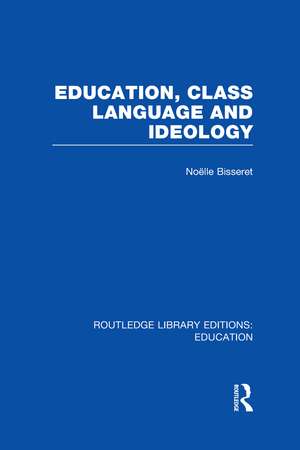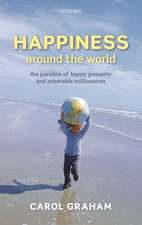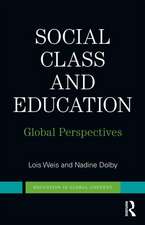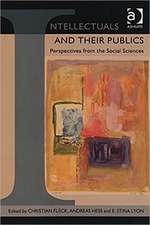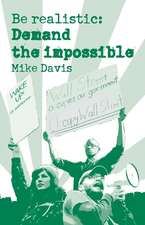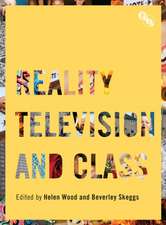Education, Class Language and Ideology (RLE Edu L): Routledge Library Editions: Education
Autor Noelle Bissereten Limba Engleză Hardback – 8 dec 2011
Din seria Routledge Library Editions: Education
-
 Preț: 566.48 lei
Preț: 566.48 lei -
 Preț: 641.87 lei
Preț: 641.87 lei - 34%
 Preț: 815.19 lei
Preț: 815.19 lei - 34%
 Preț: 981.21 lei
Preț: 981.21 lei - 55%
 Preț: 538.39 lei
Preț: 538.39 lei - 34%
 Preț: 815.19 lei
Preț: 815.19 lei - 26%
 Preț: 245.97 lei
Preț: 245.97 lei - 34%
 Preț: 815.19 lei
Preț: 815.19 lei - 34%
 Preț: 757.46 lei
Preț: 757.46 lei - 26%
 Preț: 259.85 lei
Preț: 259.85 lei - 34%
 Preț: 815.19 lei
Preț: 815.19 lei - 34%
 Preț: 815.19 lei
Preț: 815.19 lei - 34%
 Preț: 815.19 lei
Preț: 815.19 lei - 34%
 Preț: 985.28 lei
Preț: 985.28 lei - 34%
 Preț: 818.02 lei
Preț: 818.02 lei - 34%
 Preț: 816.81 lei
Preț: 816.81 lei - 26%
 Preț: 258.48 lei
Preț: 258.48 lei - 34%
 Preț: 759.80 lei
Preț: 759.80 lei - 34%
 Preț: 815.19 lei
Preț: 815.19 lei - 34%
 Preț: 981.21 lei
Preț: 981.21 lei - 34%
 Preț: 757.62 lei
Preț: 757.62 lei - 34%
 Preț: 870.52 lei
Preț: 870.52 lei - 34%
 Preț: 759.80 lei
Preț: 759.80 lei - 34%
 Preț: 816.81 lei
Preț: 816.81 lei - 34%
 Preț: 815.19 lei
Preț: 815.19 lei - 34%
 Preț: 815.19 lei
Preț: 815.19 lei - 34%
 Preț: 815.19 lei
Preț: 815.19 lei - 34%
 Preț: 758.57 lei
Preț: 758.57 lei - 34%
 Preț: 815.19 lei
Preț: 815.19 lei - 34%
 Preț: 981.21 lei
Preț: 981.21 lei - 34%
 Preț: 816.81 lei
Preț: 816.81 lei - 34%
 Preț: 815.19 lei
Preț: 815.19 lei - 34%
 Preț: 815.19 lei
Preț: 815.19 lei - 34%
 Preț: 816.41 lei
Preț: 816.41 lei - 35%
 Preț: 2088.15 lei
Preț: 2088.15 lei - 34%
 Preț: 815.19 lei
Preț: 815.19 lei - 34%
 Preț: 815.19 lei
Preț: 815.19 lei - 34%
 Preț: 759.80 lei
Preț: 759.80 lei - 34%
 Preț: 815.19 lei
Preț: 815.19 lei - 34%
 Preț: 981.21 lei
Preț: 981.21 lei - 34%
 Preț: 759.80 lei
Preț: 759.80 lei - 34%
 Preț: 815.19 lei
Preț: 815.19 lei - 35%
 Preț: 4025.35 lei
Preț: 4025.35 lei - 34%
 Preț: 732.14 lei
Preț: 732.14 lei - 34%
 Preț: 815.19 lei
Preț: 815.19 lei - 34%
 Preț: 732.14 lei
Preț: 732.14 lei - 34%
 Preț: 758.16 lei
Preț: 758.16 lei - 34%
 Preț: 981.21 lei
Preț: 981.21 lei - 35%
 Preț: 5409.00 lei
Preț: 5409.00 lei - 34%
 Preț: 759.80 lei
Preț: 759.80 lei
Preț: 759.80 lei
Preț vechi: 1154.56 lei
-34% Nou
Puncte Express: 1140
Preț estimativ în valută:
145.42€ • 151.57$ • 121.06£
145.42€ • 151.57$ • 121.06£
Carte tipărită la comandă
Livrare economică 06-20 ianuarie 25
Preluare comenzi: 021 569.72.76
Specificații
ISBN-13: 9780415504140
ISBN-10: 0415504147
Pagini: 156
Dimensiuni: 156 x 234 mm
Greutate: 0.45 kg
Ediția:1
Editura: Taylor & Francis
Colecția Routledge
Seria Routledge Library Editions: Education
Locul publicării:Oxford, United Kingdom
ISBN-10: 0415504147
Pagini: 156
Dimensiuni: 156 x 234 mm
Greutate: 0.45 kg
Ediția:1
Editura: Taylor & Francis
Colecția Routledge
Seria Routledge Library Editions: Education
Locul publicării:Oxford, United Kingdom
Public țintă
General, Postgraduate, Professional, and UndergraduateCuprins
Preface. Introduction. 1. Essentialist Ideology. Its Origins and Its Scientific form, the theory of Natural Aptitudes. 2. The Ideology at Work in Everyday Speech. The Rationalization of School Choices. 3. Language and Class Identity. The Mark of Dominant Ideology. 4. From the Theory of Differences in Aptitudes to the Theory of Differences in Linguistic ‘Codes’. 5. Shortcomings in the Theory of the ‘Unequal Distribution of Linguistic Capital’. Conclusion.
Descriere
This book presents an analysis of the ‘essentialist ideology’, which is inherent to class-based societies. The author argues that essentialist ideology is efficient through its unconscious component and is imposed on everyone. It guides school selection and imposes on each class a language specific in its reference to concrete domination relations. It even unbalances the scientific objectivity of researchers in the social sciences, not only among those who abide by the theory of natural aptitudes, but also among its sharpest critics, such as Basil Bernstein, Pierre Bourdieu and J C Passeron, whose work is considered in this book.
